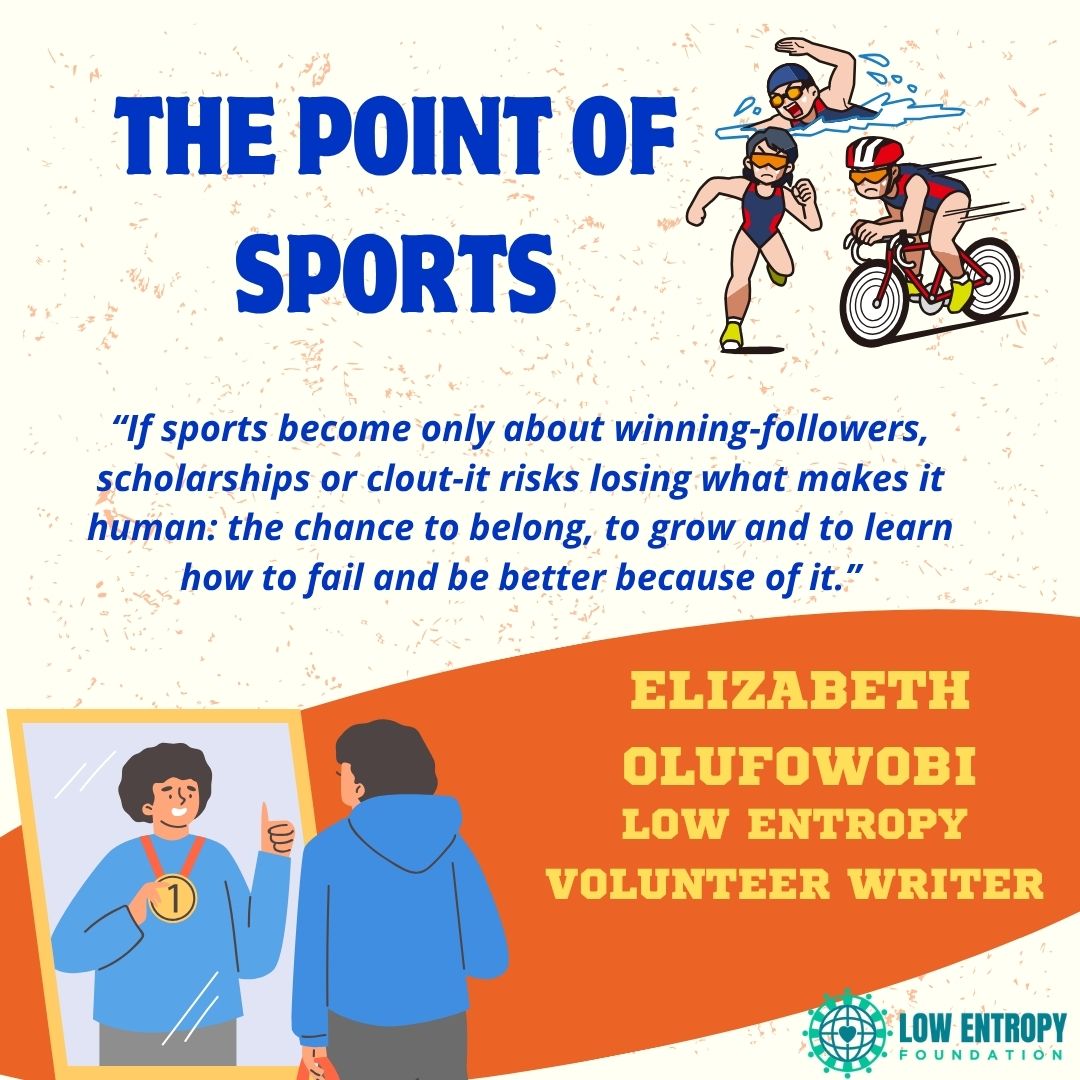Elizabeth Olufowobi (she/her/hers), Low Entropy Volunteer Writer
Being competitive has always been ingrained in my thinking and, I’ll go out on a limb and say, in a lot of other people’s too. Competition shows who is faster, stronger, smarter, more athletic and more daring. But that pressure has also been unhealthy for me. The only person you should really compete with is yourself (am I right or am I wrong? I don’t know).
I’ve always been urged to try sports. When I was younger, I was pushed toward track and field because I had “long legs.” Later, it was basketball, because I was tall. Blame my DNA.
Still, it was exciting. The lure of winning felt irresistible. I saw it in movies and on TV: those who pursued sports gained popularity, scholarships and positive attention. You could outpace your peers and become a star. I could have been a star . . . if I were actually good at them.
To understand my complicated feelings about sports, I wanted to look at where they began.
From Survival to Stadiums
Many sports, especially individual ones like wrestling and archery, developed from survival activities, such as hunting, military training and ritual contests. They were vital for the survival of the human race. They tested and developed strength and skill while also providing entertainment for both elites and the masses.
Early sports were tied to religion, beliefs, warfare and royalty. Many of the sports we know today trace their roots to ancient civilizations: boxing to Egypt (or possibly Ethiopia), soccer to ancient China, martial arts to ancient India.
Ancient civilizations formalized these contests (think the Greek Olympics) as ways to show excellence, build community identity and rehearse skills useful for survival or warfare. Over time, sport evolved from practical training into organized entertainment, social ritual and pathways to higher status.
The Ups and Downs of Sports
Today, while sports no longer prepare us for survival, they still offer immense physical and emotional benefits. They can help you grow stronger, become an elite athlete and even be celebrated publicly. Sports can bring national pride and provide opportunities for people from disadvantaged backgrounds. They can prove, to others and to yourself, that anything is possible if you put in the work.
Another benefit is social: team sports and community programs help build networks, trust and belonging. Participants often feel more confident, less isolated and more connected. Sports are also spaces where people from different backgrounds meet on the same field, playing a game they love. Cultural exchanges—of ideas, traditions and even languages—can happen locally and internationally. Sports give kids and adults a way to make friends, share a common interest and simply have fun.
But There’s a Dark Side
Although sports can be beneficial, there are hidden dangers. As someone who played all through high school, I’ve seen how sports can affect people negatively.
- Competitiveness: This can be positive if rooted in respect and camaraderie. But it can also lead to people mocking, provoking or bullying those who are less skilled, harming their mental health.
- Obsession: Sports can inspire players to push themselves, but that drive can lead to ignoring physical or mental limits—especially if someone’s identity is tied to their sport. It’s important to know it’s okay to take a break and try again later, and that failure is part of life (I’m still working on this one).
- Pressure: Encouragement is good, but too much pressure from family, friends or school can create anxiety and hurt performance. Motivate players. Lift their spirits. Give them tools to handle pressure—don’t add to it.
What Sports Should Be
To me, sports should connect people. Bridge gaps. Help us grow stronger and healthier. They teach teamwork, build physical fitness and bring a sense of fulfillment. They also reveal how we handle defeat and carry victory.
The scoreboard might show who won, but the real story is in the process: how you train, how you lift your teammate, how you respond to loss, how you stay humble after a win and how you treat an opponent.
So . . . What’s the Point?
For me, the point of sports is threefold:
- Connection: Building community, bridging differences and giving strangers a shared story.
- Growth: Pushing limits, learning discipline and practicing resilience.
- Reflection: Mirroring society—its values, its inequalities and how we treat one another. Asking us to consider what we reward and why.
If sport becomes only about winning—followers, scholarships or clout—it risks losing what makes it human: the chance to belong, to grow and to learn how to fail and be better because of it.
Even though I don’t play sports anymore, I’ll always be grateful for the skills and connections I made through them. I was never the best and didn’t always act the best. But I learned from opponents, coaches and teammates as we worked toward something bigger than ourselves: social cohesion.
That, for me, was the point of sports. It’s why I woke up early (sometimes, haha), stayed late and showed up for my team. I didn’t always love it, but I can’t deny the positive impact it had on me. Sports taught me how to show up, how to care and how to work together.
So thank you, Sports. Till we meet again.
—
Elizabeth Olufowobi is a deep thinker, storyteller and community-rooted creative who’s passionate about identity, growth and honest expression. Through her writing, she hopes to remind others that imperfection is not failure, it’s freedom.

